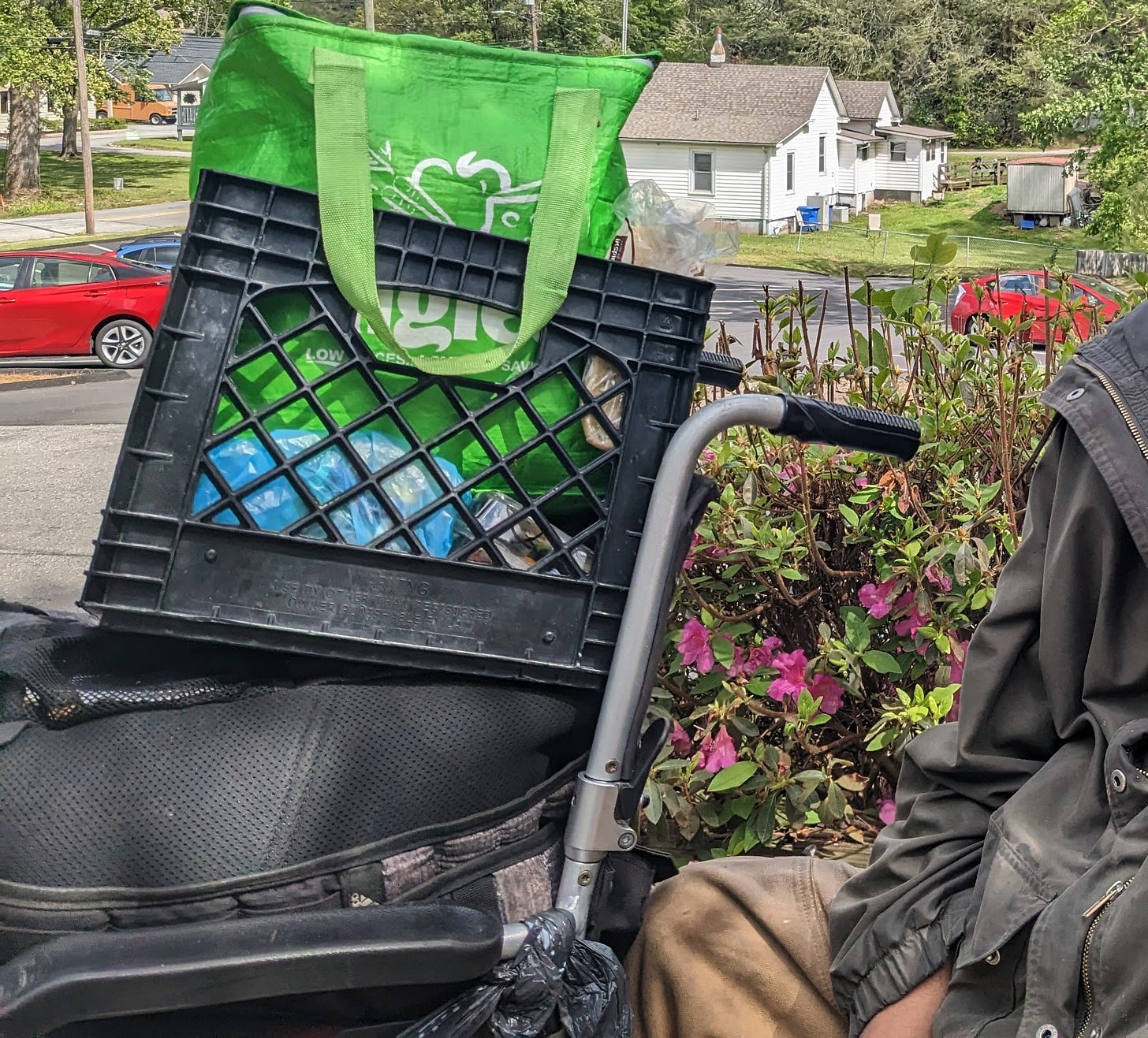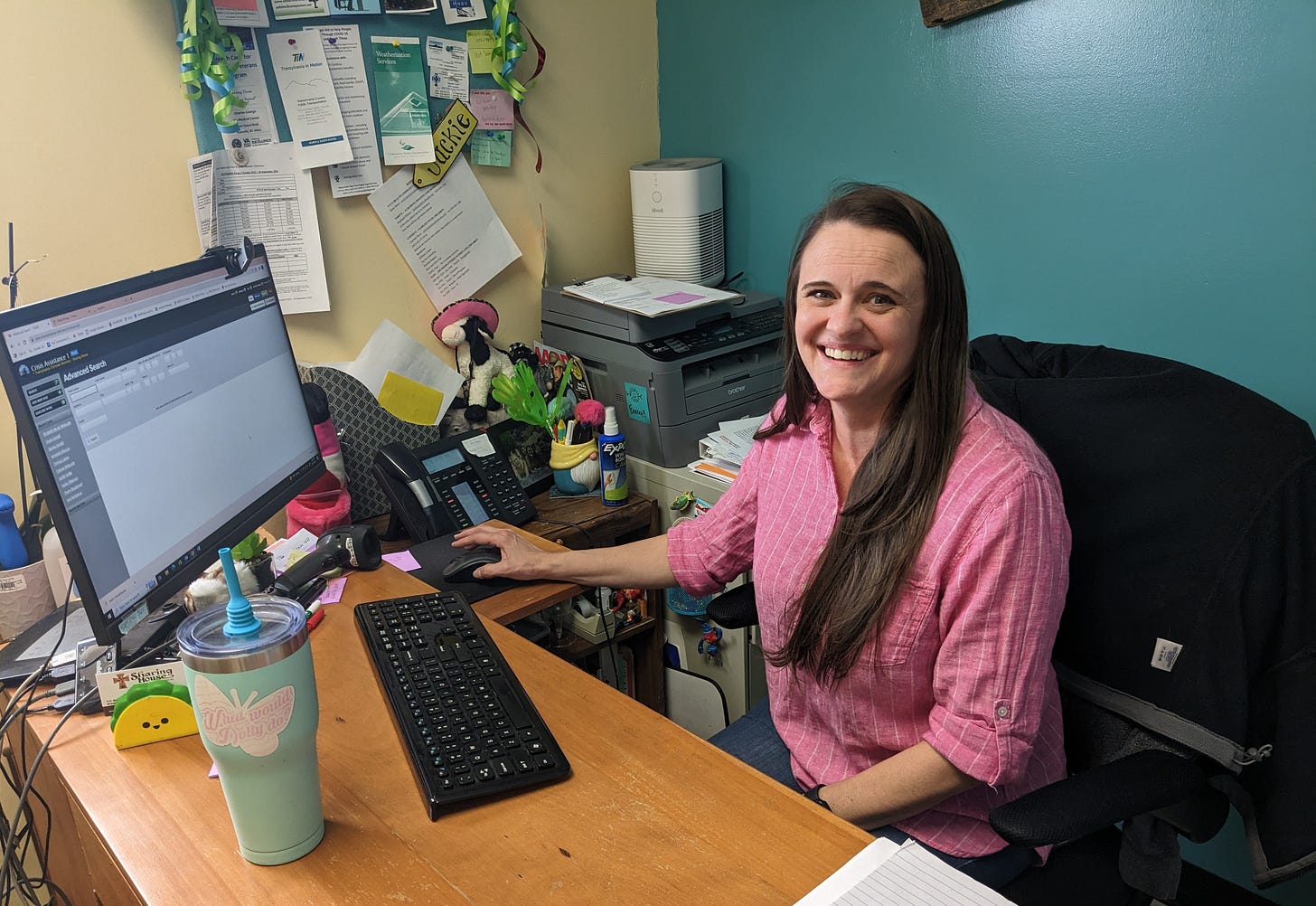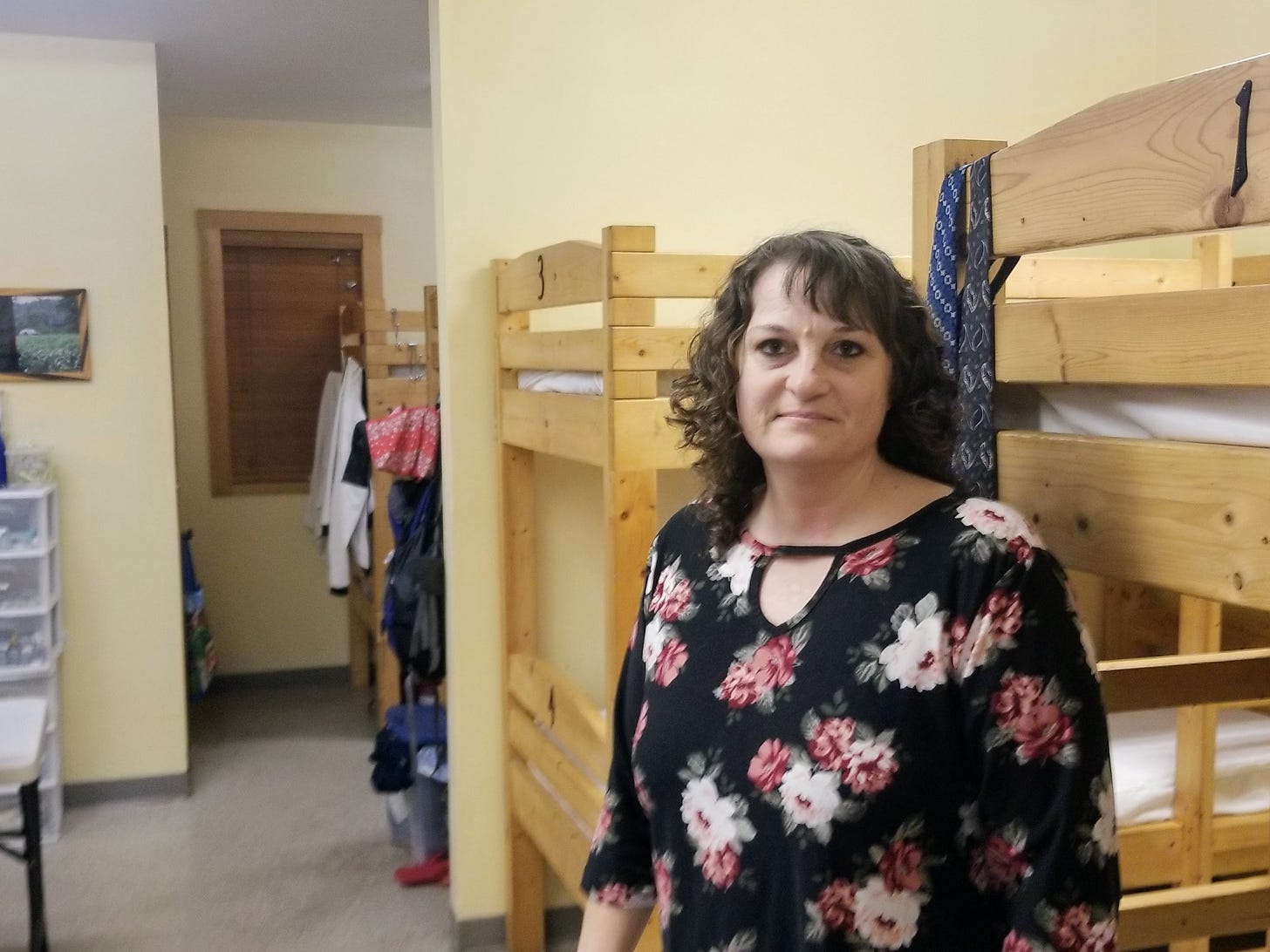Severe Staff Shortages Lead to Service Cuts in "Broken System" of Mental Health Care
Transylvania County's main provider of publicly funded mental health treatment is still offering services. But a severe lack of workers has left big gaps in crucial programs.
BREVARD — Emily Lowery, executive director of The Haven homeless shelter, stepped up to deliver a warning to the Brevard City Council earlier this month.
The Council was ready to pass an ordinance created as an alternative to an earlier, controversial plan to criminally cite unsheltered residents camping on city property.
The new policy, which Lowery had pushed for and the Council went on to approve, allows a two-week grace period while nonprofits connect campers with the help they need to get off the streets.
But one of those nonprofits is Blue Ridge Health, and one form of assistance the law imagines it securing treatment from is its own subsidiary, Meridian Behavioral Health Services — the main provider of mental health care for economically disadvantaged residents in Transylvania County.
“We do not have an outreach worker available at Blue Ridge Health,” Lowery told the Council, “and without that being in place there is a hole in the plan.”
It’s just one of many gaps in a long-strained network of state and local mental health services suffering from “crippling” staff shortages in the wake of the Covid-19 pandemic.
Thousands of vacancies at the North Carolina Department of Health and Human Services, for example, have forced 300 badly needed beds in state mental hospitals to go unused, and Gov. Roy Cooper and lawmakers routinely use the word “crisis” to describe the situation as they seek to funnel an additional $1 billion into mental health services.
But because of Tranylvania’s remote location and sky-high housing costs, its scarcity of workers may be especially acute. A recent tally showed 10 openings for mental health professionals at Meridian’s Brevard office among about 60 such vacancies across Meridian’s Western North Carolina coverage area, said Blue Ridge Chief Executive Officer Richard Hudspeth.
Medicaid-covered and uninsured patients can still access a wide range of treatment at both Meridian’s office on North Broad Street and the nearby Blue Ridge clinic, Hudspeth said. The organization has raised salaries to try to draw employees in the short term and developed training programs with nearby colleges and universities as part of its long-term recruitment strategy.
But meanwhile, community workers such as Lowery report long waits for appointments at Meridian. Calls to its office have gone unanswered. Nonprofit employees have driven distraught clients there only to find it closed in the middle of the day.
Regular behavioral health classes that were once a bedrock Meridian service are now available only online, and the organization has cut back a program that formerly provided intensive, in-home treatment for residents suffering from severe mental illness.
A separate publicly funded organization in Asheville is supposed to provide emergency crisis aid in Transylvania, said Shelly Webb, executive director of the Sharing House food pantry, but when she recently called it on behalf of a suicidal client, she was told to expect a four-hour wait.
As treatment options evaporate, more and more residents come looking for care at organizations that are unequipped to provide it, said Sharing House Crisis Manager Jackie Curtis.
“Sometimes four out of five people who walk in my door need mental health services. I see more people needing services. I see more people turning to substance abuse, self-medicating,” Curtis said.
“The system is broken.”
Meridian Now
Diminished, maybe, but not broken, Hudspeth said.
Hendersonville-based Blue Ridge, as a Federally Qualified Health Center, has been providing physical healthcare to economically disadvantaged residents for decades.
It merged with Meridian in 2021, and despite staff shortages the combined organization still provides medical and dental care in Brevard, still offers visits with psychiatrists and counselors. In recent years it has also beefed up its school-based health services in Transylvania and added therapists in schools to address the ongoing youth mental health crisis.
“It’s all about trying to stem the tide for future generations,” Hudspeth said.
Meridian could provide help to more adult clients if not for regulations that create obstacles to innovation, he said, and the organization cannot be blamed for vast, systemic problems such as homelessness.
For example, its Brevard office was never supposed to serve as a day shelter for unhoused people but was sometimes pressed into that role by a lack of other resources.
“Put a Band-Aid on the fact that someone is unsheltered,” he said, “and you still have that problem once the Band-Aid is ripped off.”
That first happened in early 2020, when the onset of Covid-19 forced the termination of in-person services at Meridian.
“Now we have more of a staffing issue than a Covid issue,” he said. “Until we can get that up to snuff, and it will take a little bit of time, we’re still going to hear those questions: What is Blue Ridge Health doing? What is Meridian doing?”
“Tearing My Hair Out”

Some questions are about simple responsiveness.
“The feedback I’ve gotten from staff recently regarding Meridian is that it’s difficult to get new referrals or general questions answered,” said Amanda Vanderoef, director of Transylvania’s Department of Social Services, which relies on Meridian to counsel adults accused of child abuse or neglect.
“What I’ve heard consistently is, it’s hard to get anyone (at Meridian) to answer the phone.”
Other social service workers point to cutbacks in specific programs designed to catch moderately affected clients before they slip into crisis or prevent deeply troubled residents from living on the streets with little or no treatment.
Meridian’s Assertive Community Treatment (ACT) Teams are staffed with a range of mental health professionals who visit the homes of severely mentally ill patients several times a week.
It’s a last line of care before involuntary admission to hospital emergency rooms or referral to the state’s (overburdened) mental hospitals. It is also a prerequisite for one of the few housing programs available for economically disadvantaged mental health patients in North Carolina, Transitions Through Community Living.
Because of staffing shortages, Hudspeth said, the program has been reduced to an ACT “stepdown” team in Transylvania, and even that service is in jeopardy — partly because it’s a prime example of regulations placed on providers that are no longer suitable in the face of post-pandemic staffing shortages.
“We are required to have seven or eight or nine members to run an ACT Team,” he said. “That’s just not going to happen.”
But its absence led to a case last month that, Lowery said, “had me tearing my hair out.” She had helped to find an apartment through Transitions for a severely mentally ill man who has been living on the streets of Brevard for most of the last decade.
The lack of a local ACT Team, however, forced her to send “him over to Hendersonville, where they do have an ACT Team,” she said, “but I caught wind that he did not stay in Hendersonville and was back in Brevard.”
She didn’t know why things didn’t work out in Hendersonville, and didn’t provide his name. But a 44-year-old man who said he had recently left Brevard to unsuccessfully access an ACT Team agreed to talk about his experiences while sitting on a bench outside the Transylvania County Library.
(NewsBeat is withholding his name, along with those of other mentally ill people interviewed, to protect medical confidentiality. For the same reason, Hudspeth said he could not comment on individual cases.)
The man picked up a plastic grocery bag from his cart of belongings and shook it, producing a rattle of pills that he said had been prescribed by a Meridian psychiatrist.
“People think they’re closed, but they’re not closed,” the man said of Meridian.
Though calm and articulate, his conversation soon veered into implausible territory about rescuing celebrities from exploitation by escort services and the danger of fatal encounters with wild animals in Brevard.
“I got a really big eye-opener about some really tough, just spontaneous wildlife business,” he said.
When asked where he was currently staying, he fingered the green nylon of his sleeping bag deep in the pile of his belongings.
“All over the place,” he said.
The Loss of a Lifeline
Meridian’s Recovery Education Center (REC) classes, which cover subjects such as coping with grief, establishing social boundaries and managing anger, have been available only online in Transylvania since the start of the Covid-19 pandemic.
They once provided a lifeline to residents of The Haven, an extended-stay shelter designed to serve as a bridge to permanent housing and employment, Lowery said.
The sessions are led by trained “peer-support specialists” who had previously experienced the struggles of participants. When classes were held in person, some Haven residents spent hours every day in the sessions at Meridian, where they could also socialize in a safe environment and learn about other treatment options.
“I had so many people go through those classes and learn so much,” Lowery said. “One specific person told me, ‘I think I could teach this class now,’ and she’s still housed now, and she’s still in recovery. She’s one of our success stories.”
Online treatment, on the other hand, is of little help to residents without internet or a private space for counseling, which is often true of homeless people who make up a small percentage of Blue Ridge clients but who are often most likely to be affected by severe mental illness.
Of the several unhoused people interviewed for this story, all said they had been diagnosed with a mental health condition; none said they were currently taking REC classes.
“You can’t really access the services as it operates right now,” Lowery said. “You can’t walk in to get the services you need.”
“Cold Handoffs” and “Too Much Drugs”

This is part of a bigger picture of depleted access to Meridian, which nonprofit leaders describe as increasingly faceless, increasingly likely to leave clients giving up on professional care.
Seeking to find mental health care and housing for a clearly troubled homeless woman on an unseasonably cold day last month, Webb texted the Blue Ridge outreach coordinator.
She didn’t know the position was vacant, as Lowery later pointed out at the Council meeting. (Council passed the law contingent on the job being filled by the time the policy goes into effect in July.)
Webb also called Meridian and, getting no answer, drove the woman to its Brevard office, which was closed. Though Webb was able to reach a Blue Ridge staffer by telephone and eventually drop the woman off at its clinic, Webb later learned that she walked away without treatment.
And it wasn’t until three weeks later that Webb received the following response to her text.
“Hi Shelly. Sorry to have missed your text. We currently do not have a community health worker in Brevard and I’m trying to find someone. We don’t offer a place to stay ourselves and we typically refer to shelters like (The) Haven — hopefully she can access the shelter.”
Another, less dramatic example of barriers to treatment, Curtis said, are “cold handoffs,” such as “a piece of paper with the name of a person to call” — which is often all she can offer to clients when she tries to find them help through Meridian.
“I like warm handoffs. ‘Let’s find a person who can get you help. Let’s figure out the time when you can go see them,’ ” she said, “and that’s very difficult to do right now.”
And without such guidance for clients who are “feeling really bad,” she said, “it can be a lot easier to get a substance off the street than to get an appropriate medication regimen and get treatment.”
She said this in her office at Sharing House. Minutes later, in a neighboring office, a burly 25-year-old man slumped in a chair and said, “my heart is hurting right now.”
The young man had previously received counseling at Meridian, and it had helped, he said. He did not say if he had tried to access such treatment since his most recent of several stays at a psychiatric hospital, but he did say he wasn’t receiving any.
The hospital had prescribed medication to treat his schizophrenia, he said, but he lost it in the chaos of “couch surfing” in the homes of friends. He has since been relying on illegal substances, which he said explained his blank demeanor and one-sentence answers.
“Sorry,” he said after yawning, “I took too much drugs.”
How We Got Here
It wasn’t always this way, said Judith West, a retired clinical social worker and the Transylvania office of Trend Community Mental Health Services.
Such local, state-funded treatment centers began to replace psychiatric facilities all over the country after the passage of a 1963 federal law that encouraged deinstitutionalization.
Because West’s office in Brevard offered a range of services under one roof, care was easily coordinated, she said, and its employees formed long-term professional relationships with clients.
“The staff knew the community,” West said. “They were more likely to live here and they stayed a long time.”
To control costs, the state passed a law in 2001 that led to the closure of community mental health centers and the privatization of their services under the oversight of local management entities (LMEs), a role now filled by Asheville-based Vaya Health.
Sharing House’s Curtis, a qualified mental health professional, started working for an LME-supported company in 2004, she said, and encountered a fragmented system mired in bureaucracy.
When training new workers, said Curtis, “I used to tell people, you are no longer writing in English, you’re writing in Medicaid.”
And there were a lot of new employees because, even at the end of her eight-year stint in community mental health, the system was plagued by high turnover, she said.
“The barrier in Transylvania County has always been workers. If you could get them here you can’t get them to stay because of the cost of living.”
The Post-Covid Reality
Then came Covid-19, which initially allowed Meridian to provide a wider range of online counseling options in Transylvania — including intensive substance abuse therapy — as Medicaid reimbursed more “telehealth” services, Hudspeth said.
But private insurers also expanded coverage of remote treatment for the soaring numbers of Americans who reported suffering from anxiety and depression during the pandemic. This led to an explosion in the online counseling industry, which has siphoned off the limited number of professionals who might otherwise work in community mental health.
“We had a tight supply of clinicians to begin with and now we have demand going through the roof and clinicians are nowhere to be found,” Hudspeth said. “I can sit in my house as a therapist and I can do telehealth services anywhere across the county, and I can get paid a lot more money.”
Which roughly describes the career path of Christine Abassary, an adjunct psychology professor at Brevard College.
She spent many years working with American Indians on reservations in her previous home of New Mexico. When she moved to Western North Carolina a year ago, she was looking for a change and found it as an independent online therapist seeing a handful of patients a day.
“I’m not getting wealthy,” said Abassary, 53, “but I’m meeting my needs and keeping my expenses low, so I can just go out and hike in the morning and have coffee and feel good about transferring that positive energy to the people I see.”
Is Money the Answer?
Meridian has tried to respond to this new pattern of employment, Hudspeth said.
While declining to provide Meridian’s exact wages, he said the organization has boosted benefit packages and “increased salaries for all our positions, many by double digits.”
He also said that long-term efforts such as the Meridian training programs are crucial, because raises alone won’t get to the root of the staffing problem — the narrowing pipeline of professionals available to work in public mental health.
“They’re just not out there,” he said.
But money’s a problem, he acknowledged, and he described the challenges of finding adequate funds from sources slow to respond to inflation in health care that has skyrocketed in recent years and, even before that, outstripped cost increases in other sectors of the economy.
Blue Ridge’s $53 million in revenue in fiscal year 2022 came from a range of sources, including private insurers and federal grants. But it relied heavily on Medicaid, taking in $11.1 million from the program in fiscal year 2022, according to a publicly available audit from March of last year.
Vaya, which supports and monitors a wide range of for- and nonprofit providers both locally and throughout its 31-county coverage area, paid Meridian $6.5 million that same year, most of it from Medicaid, according to Drew Elliot, the LME’s vice president of public affairs.
Along with being a major source of funding, Medicaid provides an especially clear example of the stagnation in revenue, Hudspeth said.
Over the past decade, as state lawmakers resisted expanding the program — which is mostly funded by the federal government but controlled by states — its reimbursements for mental health services remained unchanged.
Hudspeth was quick to say that reimbursements were temporarily increased during the pandemic, but he also offered the code for one service, a “moderately complex office visit,” for which the Medicaid payment had actually declined slightly between 2013 and 2022.
Due to such funding patterns statewide, “services have been scaled back, affecting the availability and the capacity of care,” said Chris Fink, a board member of the North Carolina chapter of the National Alliance on Mental Illness.
“There’s been a quiet, pernicious cutting of community mental health services.”
Hope on the Horizon
So, the state’s approval of Medicaid expansion earlier this year will no doubt help.
It extends coverage to hundreds of thousands of uninsured residents and is the source of the $1 billion in both Cooper’s plan and a bill with similar provisions introduced last month by a bipartisan group of state representatives; the money comes from a one-time bonus paid to holdout states that had resisted expansion.
A major chunk of the planned investment — $225 million in Cooper’s proposal — would go to increase Medicaid reimbursements. Significant sums will also help address understaffing at mental hospitals and bolster services that local leaders say are especially needed to fill the gap between hospitalization and walk-in clinics.
“Our behavioral health system has been under-resourced for decades, and this plan begins to address these long-standing needs,” said NCDHHS Secretary Kody Kinsley, who is scheduled to appear at a town hall to address mental health services at 6 p.m Thursday at Brevard College’s Porter Center.
“This investment will ensure that every child and adult in North Carolina can get the help or treatment that they need, when and where they need it.”
But considering the vast costs of mental health services, a one-time $1 billion investment isn’t a fix, it’s a start, Hudspeth said. People involved in delivering that care need to think long term, he said. They need to ask how they can provide training to bring more counselors into the field, he said, how they can deliver services more efficiently.
“We have an opportunity right now to innovate,” he said, “and we need the same sense of urgency we had around the Covid virus and apply it to the mental health crisis.”
Email: brevardnewsbeat@gmail.com






